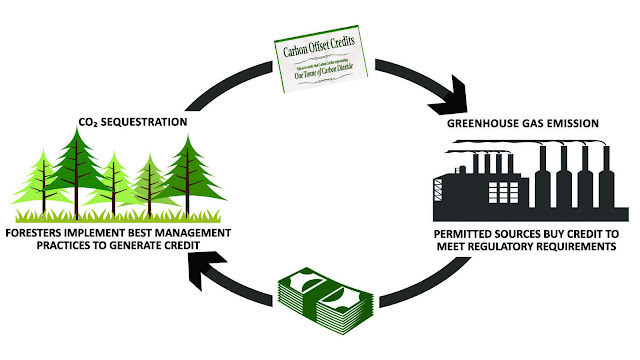Carbon Credit Efforts Is To Mitigate Climate Change And Reduce Greenhouse Gas (GHG) Emissions
 |
| Carbon Credit |
Carbon
Credit is a crucial component of global efforts to mitigate climate
change and reduce greenhouse gas (GHG) emissions. They are a mechanism that
incentivizes organizations and individuals to reduce their carbon dioxide (CO2)
and other GHG emissions by providing financial rewards for emissions
reductions. The underlying principle of carbon credits is based on
the concept of carbon offsetting. It recognizes that emissions reductions can
be achieved by either reducing emissions at the source or by investing in
projects that reduce emissions elsewhere. Carbon credits represent a unit of
measurement that quantifies the reduction, avoidance, or removal of one metric
ton of CO2 or its equivalent in other GHG emissions. These credits are tradable
and can be bought and sold.
The process of Carbon
Credit trading begins with the establishment of a baseline emission
level for a particular entity or project. In order to quantify emissions
reductions, this baseline acts as a standard. If the entity or project achieves
emissions reductions beyond the baseline, it is eligible to receive carbon
credits. These credits can then be sold to other organizations or individuals
that have not met their emission reduction targets. The
projects that generate carbon credits can take various forms. For example,
renewable energy projects such as wind farms or solar power plants can generate
credits by displacing electricity generated from fossil fuels. Energy
efficiency projects that reduce energy consumption and thus emissions also
qualify for credits. Additionally, projects focused on reforestation and
afforestation, which absorb CO2 through the growth of trees and vegetation, can
generate carbon credits.
According
To Coherent Market Insights The Carbon Credit Market Was Worth US$ 25,345.8
Million In 2022, With A Compound Annual Growth Rate (CAGR) Of 24.4% From 2023
To 2030.
The value of Carbon
Credit is determined by demand and supply dynamics. Governments and
international bodies often regulate and oversee carbon to ensure their
transparency and integrity. Participants include companies, governments, and
individuals who either buy or sell carbon credits. Buyers may include companies
seeking to meet their emission reduction targets or investors looking for
sustainable and environmentally responsible investment opportunities. The
significance of carbon credits lies in their ability to provide financial incentives
for emission reductions.
By assigning a monetary value to carbon
emissions, they create economic incentives for organizations to invest in
cleaner technologies, renewable energy, and sustainable practices. This
approach encourages innovation and the adoption of low-carbon technologies,
ultimately accelerating the transition to a more sustainable and low-carbon
economy. Moreover, carbon credits contribute to international
efforts to combat climate change. They provide a mechanism for developed countries
to support emissions reductions in developing nations through financial
investments in Carbon Credit projects.
For
More Details On Carbon Credit Visit: Https://Www.Globenewswire.Com/En/News-Release/2021/07/01/2256485/0/En/Global-Carbon-Credit-Market-Is-Estimated-To-Account-For-US-2-407-8-Mn-By-End-Of-2027-Owing-To-Increasing-Global-Warming-Impact-Says-Coherent-Market-Insights-CMI.Html
You
Can Also Read Press Release: Https://Www.Coherentmarketinsights.Com/Press-Release/Carbon-Credit-Market-3727



Comments
Post a Comment